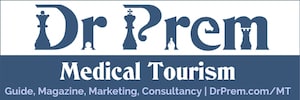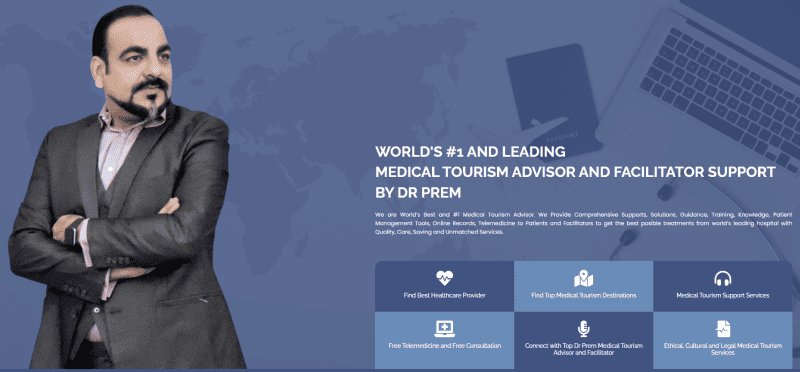Effective handling of patient objections in medical tourism is a critical success determiner. Prospective patients will express interest but will pause before purchase. The journey from the ‘interested’ stage to the ‘purchase’ stage is ridden with thorns of concerns, doubts, apprehensions, and hesitation. As a medical tourism facilitator or provider, the way you remove those thorns one by one proves your mettle.
Patient objections are not limited to concerns about price and quality. As medical tourism trends have evolved, patient objections have diversified and grown more pronounced.
In this medical tourism guide, you will learn about common and unique patient objections to medical tourism and actionable strategies to address them. You will learn nuances of communication and specific tips that can turn a hesitant ‘no’ into a confident ‘yes’. Let’s go ahead.
Here are some of the typical patient objections in medical tourism
A Guide on How to Handle Patient Objections in Medical Tourism by Dr. Prem – Understanding Common Concerns, Resolution Strategies and Essential Tips
-
Perception of High Price
-
Concern for Quality
-
Language barrier
-
Follow-up care
-
Legal Protection
-
Travel logistics
-
Financial concerns
-
Treatment Expectations
-
Cultural Differences
-
Safety concerns
-
Waiting time
-
Insurance Portability
-
Unknown Medical Standards
-
Support System
-
Informed Consent
-
Continuity of Care
-
Hidden Costs
-
Complication Management
-
Destination Reputation
-
Travel restrictions
-
Facility Overcrowding
-
Ethical Concerns
-
Travel-related Health Risks
-
Information updation
-
Social Stigma
-
Delayed Recovery
-
Unfamiliar Technology
-
Postponing Plans
-
Special Tips for Providers and Facilitators
-
Get Dr. Prem’s Support
Perception of High Price
Objection: “The price is too high compared to other options.”
Solution: Place your value proposition intelligently before mentioning your price. Highlight your offerings’ comprehensive benefits, including travel, accommodation, and high-quality care. Compare the cost-effectiveness with other options explaining the potential of long-term savings and avoiding repeat treatments or ongoing healthcare costs.
Concern for Quality of Care
Objection: “I’m worried about the quality of care I’ll receive abroad.”
Solution: Provide clear and verified information about the qualifications, certification, experience, and accomplishments of the physicians and recognized facility accreditations. Educate patients about the importance of accreditations. Share patient reviews, success rates, and accolades demonstrating specific quality standards. Provide comparative data about the quality of care with other domestic and international facilities.
Language Barrier
Objection: “I’m concerned about not understanding the local language.”
Solution: Highlight the availability and ongoing support of multilingual staff or interpreters at the destination facility. Ensure zero chances of misinterpretation of communication due to the language barrier. Assure of on-demand personal language support. Provide documents in the patient’s preferred language assuring them of proper understanding of their needs with empathy.
Follow-Up Care
Objection: “I’m unsure how follow-up care will work when I return home.”
Solution: Highlight your robust follow-up care plan including post-treatment recovery at the destination, collaborative arrangements with local healthcare providers, and telemedicine support at home. Explain the procedure in detail convincing them of continuity of care for a reasonable period. Introduce them to your follow-up care personnel beforehand.
Legal Protection
Objection: “What happens if there are complications or legal issues?”
Solution: Educate patients about potential legal issues in medical tourism, patient rights, and the legal framework in the destination country. Detail them about medical tourism insurance covering complications and explain dispute resolution processes available, underscoring that patient safety is a priority.
Travel Logistics
Objection: “I’m overwhelmed with the travel planning details.”
Solution: Highlight your travel concierge services that handle everything from visa assistance and airport transfers to hotel arrangements, hospital admission, local transport, and sightseeing. Ensure a seamless process with a detailed explanation of your operation modalities.
Financial Concerns
Objection: “I’m unsure if I can afford the procedure.”
Solution: Offer transparent pricing with a comprehensive breakdown of costs. Provide flexible payment plans, financing options, or insurance partnerships. Educate them about other ways of financing medical tourism. Help them secure the best option.
Treatment Expectations
Objection: “Will I get the desired results from the treatment?”
Solution: Set realistic expectations by explaining how the treatment or surgery can improve their quality of life. Mention the possible variations in treatment outcomes based on age, sex, and physical condition. Highlight real-life examples, testimonials, and case studies of similar patients to give a clear picture of expected outcomes. Share success stories and before-and-after photos to build confidence in the results.
Cultural Differences
Objection: “I’m uncomfortable with different cultural norms.”
Solution: Convincing a patient to take treatment beyond their cultural comfort zone is a real task. Culture has influenced an individual’s healing practice for ages. Have a great understanding of the patient’s cultural background – what they are used to and where they find comfort.
Provide documented guides to help patients understand the destination’s culture. Nurture a culturally competent team to address patients hailing from a specific culture. Hire cultural liaison executives or coordinators to ensure patient comfort.
Safety Concerns
Objection: “Is the destination safe for travel?”
Solution: Share updated safety data from credible sources, including government travel advisories. Share the safety and hygiene protocols of the recommended healthcare facility is compliant with global standards. Outline security measures taken by the facility, such as patient escorts, care support, and secure accommodations prioritizing patient safety.
Waiting Time
Objection: “How long will I have to wait for treatment?”
Solution: Provide a streamlined appointment schedule and flexible treatment slots. Set a realistic timeframe covering preliminary consultation, required diagnostics, and the treatment schedule helping patients plan their itinerary. Highlight your efficient operation system like same-day consultation, diagnostics, and swift facility admission procedures that are more resource-saving.
Insurance Portability
Objection: “Will my insurance cover treatment abroad?”
Solution: Work directly with insurance companies to understand their policies. Tie up with global insurance providers for seamless claim settlements without causing an iota of worry to patients. Educate patients about the coverage schemes and facilities to remove confusion in claims. Provide documentation compatible with insurance claims and offer assistance in filing.
Unknown Medical Standards
Objection: “Are international medical standards on par with those at home?”
Solution: Emphasize accreditation by recognized global organizations like JCI (Joint Commission International), TEMOS, ISO (International Organization for Standardization), or ISQUA. Share protocols that align with international guidelines. Provide additional information on AMR (Anti Microbial Resistance) policies, surgical safety protocols, and patient’s rights guidelines. Offer virtual tours of facilities to provide a first-hand look at the quality standards.
Support System
Objection: “I don’t have anyone to accompany me.”
Solution: Consider offering local support services, including patient coordinators and caregivers who can offer compassionate companionship throughout the journey. Introduce those caregivers to the patients and explain their efficiency and dedication to providing the best support and comfort. Connect with reputed caregiving centers having certified personal support staff. Have a proper contract system in place with clearly defined services.
Informed consent
Objection: “I don’t understand the terms and conditions of the consent form”.
Solution: Create the consent form in the language that the patient understands. Avoid using too many complex sentences and legal terms that are hard to comprehend. If at all these are needed, make sure you explain things clearly to the patient’s satisfaction. Ensure zero confusion in reading/understanding the consent form.
Continuity of Care
Objection: “I don’t want to switch doctors mid-treatment.”
Solution: Ensure an end-to-end care plan where the patient will be treated by a dedicated team of physicians and care staff without needing any third-party intervention mid-way. Develop a seamless action chain with the proper person/system at every touchpoint.
Hidden Costs
Objection: “Are there hidden or unexpected costs I need to know about?”
Solution: Be transparent about costs. Provide a breakup of treatment and service costs creating no room for ambiguity. Offer comprehensive estimates that include all foreseeable expenses. Create an inclusive and non-inclusive list for better clarity. Try to add more value for money at every step.
Complication Management
Objection: “How will complications be managed if they occur?”
Solution: Outline a contingency plan for complications including on-site medical care, repatriation, emergency evacuation, extended stay arrangements, and referrals to local specialists. Document your support covering all emergency factors that you offer. Ensure medical travel insurance covers these scenarios.
Destination Reputation
Objection: “Is this destination known for quality healthcare?”
Solution: Provide information on why the destination or facility is well-known for specific treatments. Share expert credentials, legacy, accolades, and success rates of the facility. Share government initiatives, partnerships with leading institutions, and research contributions to bolster credibility. Share patient testimonials.
Travel Restrictions
Objection: “Are there any travel restrictions I should worry about?”
Solution: Keep patients informed about evolving travel regulations and requirements, such as visas or vaccination policies. Update them about any political unrest happening in the destination that can impact travel and treatment. Offer advice on public health guidelines or other public health concerns.
Facility Overcrowding
Objection: “Will the facility be too crowded for adequate care?”
Solution: Highlight the patient-physician ratio of the facility and the personalized attention given to each patient. Demonstrate how the facility manages patient flow to ensure individual needs are met without making it overcrowded. Provide a tour of the daily patient inflow and operation system that prevents overcrowding.
Ethical Concerns
Objection: “How can I be sure the facility is operating ethically?”
Solution: Provide evidence of ethical practices through third-party certifications and patient reviews. Describe adherence to international codes of conduct, such as informed patient consent, treatment transparency, patient rights, and other strategies upholding patient safety.
Travel-Related Health Risks
Objection: “I’m worried about potential health risks due to travel, like deep vein thrombosis.”
Solution: Provide patients with travel health tips, like staying hydrated, moving frequently, and using compression socks. Assure physician-recommended personalized guidelines to ensure safe and complication-free pre and post-treatment travel. Keep provisions for trained medical escorts if necessary.
Information updation
Objection: “How will my family be updated about my treatment and recovery?”
Solution: Assure patients about your robust communication system that will update your family members at home about your treatment and recovery progress through phone calls, emails, and WhatsApp.
Social Stigma
Objection: “I’m afraid my community will judge me for seeking a (specific) medical treatment abroad.”
Solution: Assure them that it is normal to opt for medical tourism for specific treatments. Educate patients with authentic data and information about the growing trend in medical travel. Share success stories of patients. Ensure patient privacy regardless of the treatment they are looking for and the destination.
Delayed Recovery
Objection: “I’m worried about the recovery. I might miss the joy of tourism.”
Solution: Provide a recovery timeline with ample rest periods built in. Offer detailed postoperative care instructions, rejuvenating wellness programs, and a realistic schedule to cover all these. Reassure the patient that they will have adequate time to recuperate before resuming tourism activities.
Unfamiliar Technology
Objection: “I’m not comfortable with new medical technologies being used.”
Solution: Provide comprehensive information about the cutting-edge technology used in procedures. Highlight its safety record, success rates, benefits, and international acceptance. Assure patients of speedier recovery with advanced treatments reducing their stay and associated costs in the foreign destination. If possible, offer a virtual tour or demonstration to demystify its usage.
Postponing Plans
Objection: “I’m not ready to go for the treatment now. I Will think of it later”.
Solution: Emphasize that postponing treatments will worsen the condition and increase cost. Highlight that getting treatment sooner means enjoying benefits sooner, resulting in enhanced well-being and mental peace. Delaying actions means missing out on these pleasures and facing a higher cost, which typically tends to rise rather than fall.
Special Tips for Facilitators and Providers
Despite understanding patient objections, handling them day in and day out can be overwhelming. It is natural for humans to evade stepping out of their comfort zone even if there is a dire need, especially in healthcare. Therefore, erasing hesitations and concerns from their mind can be exhausting.
How can you tackle it easily providing the desired comfort to your prospective patients? Here is a basic checklist.
Always take an empathy-driven approach
The first level of comfort builds with empathy. Show genuine empathy and listen carefully to the patient’s unique concerns. A personalized response will increase confidence in the facilitator’s competence.
Maintain Transparent Communication
Make sure your words are easily understandable to the patient. Maintain a friendly and cordial tone while communicating. Avoid industry jargon or ambiguity. Ensure patients are well-informed and make decisions with a comprehensive understanding of the treatments, outcomes, and offerings.
Display Cultural Sensitivity
Respect and recognize the patient’s cultural background. Understand their unique cultural orientation towards healing systems and consider them in your communication style and decision-making, adapting your approach as necessary.
Data-Backed Assurance
Provide patients with data and facts to reinforce your points, demonstrating credibility. Avoid creating stories to win patient confidence. Patients will crosscheck every information from reliable sources, and a single piece of misinformation can ruin your reputation.
Provide a clear Timeline
Set a clear and stepwise timeline for the itinerary covering travel, pre-treatment conditioning and consulting, hospital stay, and recovery phase. Explain how patients will be updated during each stage. The more you are confident in explaining these the more confidence a patient will find in you.
Build local Partnerships
Establish partnerships with local healthcare providers and facilities for seamless follow-up care. A strong network improves the patient’s sense of safety and support. They feel more confident that they will have somebody to turn to when needed.
Handling patient objections in medical tourism requires a proactive, empathetic, and well-informed approach. By understanding the root of each objection and offering thoughtful, personalized solutions, facilitators and providers can help patients feel confident and secure in their decision to pursue treatment abroad. Communication remains at the heart of this process, ensuring that every patient receives the support and assurance needed to overcome hesitations and commit to a journey of improved health and well-being.
Get Dr. Prem’s Support
Dr. Prem Jagyasi, a globally recognized medical tourism and wellness expert makes your patient acquisition in medical tourism super easy. With extensive medical tourism consultancy experience and hosting impactful masterclasses in 70 countries, he offers insightful plans tailored to respective business needs. Whether you are a medical tourism facilitator, a healthcare facility, or a clinic struggling to convert hesitant and skeptical patients, Dr. Prem’s medical tourism advisory will help you overcome these barriers with effective strategies and systems in place. Patients will never find a reason to say no. Ready to go ahead? Connect with Dr. Prem today and revolutionize your patient conversion where every lead becomes an advocate of your medical tourism business.
























